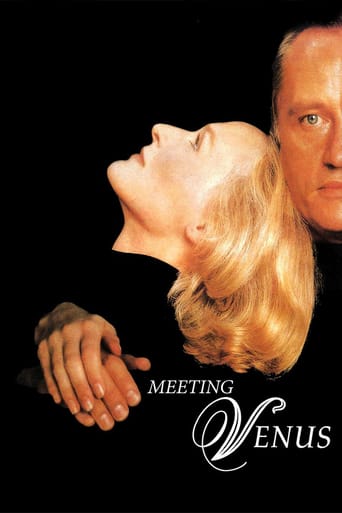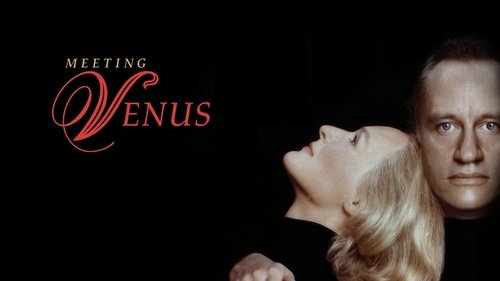Michael Neumann
A Hungarian conductor tries to unite a multi-national European opera company preparing for a televised production of Wagner's Tannhauser, with mixed results. The same might be said of the film itself, which represents director Istvan Szabo's bid for a wider slice of international box office. Unfortunately, what begins as a mild but engaging Murphy's Law comedy (complete with labor disputes, political arguments, artistic conflicts and so forth) soon devolves into a phony feel-good melodrama, with all the comic frustrations of the early scenes jettisoned in favor of a predictably stormy off-stage romance between the conductor and his temperamental superstar diva (Glenn Close). A few incidental pleasures and an attractive, charismatic cast (presenting the entire European community in a fascinating microcosm) aren't enough to hide all the obvious shortcomings, including (but not limited to) shoddy lip-synching, unnecessary voice-over commentary, and the assumption that listening to Wagner is like dying and going to heaven.
benjamin-staern
I've seen this movie many times now. It covers most of the things that is evident in an opera house and productions. Though some of the sceneries, dramatic situations are slightly exaggerated, I still think it is well achieved attempt to recreate typical scenes of an opera production, love stories, conflicts with opera managers, strikes, problems with orchestral musicians and singers, corrupt non-environmental cooperation sponsors, Paris and Budapest cultural milieus. But there is some small flaws. Erland Josephson who plays Picabia (General Director of Opera Europa) is a great actor but he doesn't do it all well with his Spanish pronunciation and pronounces Karin in with real Swedish accent. Otherwise he's portraying the role of with absolute perfection.Glenn Close is simply marvelous as the Swedish soprano and Niels Arestrup as Maestro Szanto is very credible in his role as the conductor.The music from Tannhäuser by Richard Wagner works as a third character in this movie, same function as the other movie Amadeus (1984) by Milos Forman. I would recommend anyone to see this movie, to simply enjoy it over a nice evening!!
nycritic
Imagine you are one of Europe's most celebrated composers and that you have been invited to Paris to conduct a production of Richard Wagner's "Tannhauser" for the Opera Europa. You will be given a multinational cast of singers, musicians, and strong, bold sets which are meant to elevate the opera to its biggest heights. You arrive, feeling a little inadequate since Parisians are known for being artistic elitists, the Germans believe only they can produce such a magnificent masterpiece and you. Although you are accepted with applause, the pressure is on.And then imagine that anything and everything that could possibly go wrong takes place with the increasing craziness of a domino dance. Musicians and singers both have unions and demand having more controls over the schedules. Artistic vanity runs amok within the actors, singers, and pretty much everyone else who has their own over-inflated self-importance. One young singer falls, has an accident, and cannot continue with the rehearsals. Another one, an American, receives a visitor from what seems to be an ex-lover, causing not only an inflamed jealousy in his current partner but a screaming match that ruins the American's voice. And on top of this, you, the composer, are not only at odds with your leading lady, but somehow have found yourself doing an about-face and initiating a torrid love affair with her. And your wife finds out. Which may ruin your marriage.Not a good thing, if Tannhauser is to be produced. Istvan Szabo brings this elegant farce of love and opera as if he's been there himself: as a director, he could be telling this story as if he himself were Zoltan Szanto (Niels Arestrup) the composer. His view of Szanto is one that looks like compassion: this is a man who is trying, against all odds, to create something unearthly beautiful, but the very humanity surrounding him is the main obstacle and at times seems like it will succeed and Tannhauser will not survive. And then when he falls for Karin (Glenn Close in a role tailor made for her), he completely and irrevocably falls for her, but at times I wonder, does she feel the same for him too? A Diva has been known for creating a web of romance around her composer/director more than once. It's as if Istvan Szabo were telling us that probably the love she feels may be a well-practiced pose to ensure her moment in the spotlight. That all Divas do are make themselves available for the sake of their own vanity.MEETING VENUS is a rarity of films because it never tries to be an easy farce and is too eccentric in its intertwining, very European characters. Plots aren't solved in the satisfying way that most ensembles would require: that is up to Tannhauser to do, itself as much a character as its human counterparts, to reveal itself like the flower that suddenly blooms at the tip of Szanto's bow despite the intrigues, the near-misses, and even the last-minute inability to even open the stage which reduces the performance to just that. And this is what makes a performance soar: its very presence, its own transcendence, the symbolic meeting and revelation of Venus among the audience.
joska kerekes
This film is much more than a customary movie about opera, though opera lovers get first-rate extracts from Wagner's Tannhauser as well. The action takes place in an imaginary "Opera Europe" in Paris. István Szabó, the excellent film director is really interested here in fanatic people of the theater who came from several countries of Europe to unite their talent in order to create a successful performance of Wagner's youthful masterpiece. The ensemble is a mixture of multinational people: the head of the company (a Spaniard, a former hero of the Spanish Civil War,) her private secretary and mistress (descendant of a noble Russian family,) the conductor (a talented young Hungarian who suffers from inferiority complex because of his East-block origin,) the singer who plays Tannhauser (a permanently offended dumpy man from the DDR with beautiful voice,) the French theatrical technician (a pig headed trade unionist who causes much trouble,) etc. They carry with themselves all good and vicious habits and traditions of their origin which cause many conflicts but humorous episodes as well during the rehearsals. There is a remarkable scene when at a dinner party the protagonists put aside all of their conflicts and sing together a song called "Suliko" which was once Stalin's favorite. (They sing it not because they love Stalin, but because of a certain nostalgia for their youth.) In the center of the story stands the Hungarian conductor's and a Nordic singer's (played by Glenn Close) stormy love affair which ends in diminuendo (using here deliberately this term of music.) Strongly recommended for everyone who loves art and theater.




